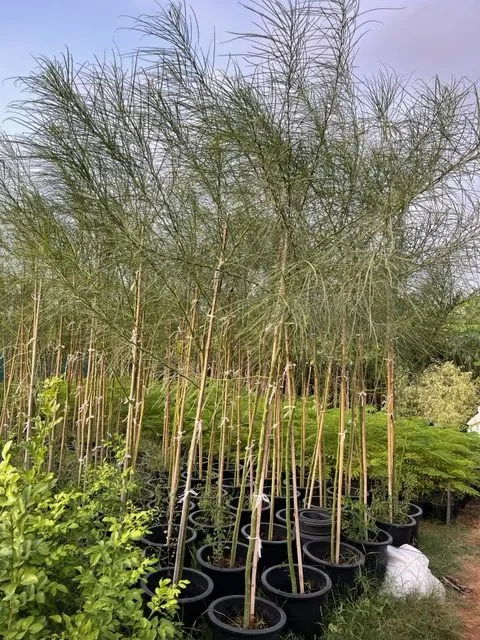Description
Parkinsonia aculeata, commonly known as the Mexican Palo Verde or Jerusalem Thorn, is a species of flowering tree native to the southwestern United States, Mexico, and Central America. It belongs to the Fabaceae family and is known for its feathery foliage and showy yellow flowers.
Here are some key features and characteristics of Parkinsonia aculeata:
- Appearance: Mexican Palo Verde is a small to medium-sized deciduous tree with a distinctive appearance. It typically grows up to 20-30 feet (6-9 meters) tall, with a spreading canopy and multiple slender, thorn-bearing branches. The branches are green and photosynthetic, allowing the tree to conserve water in arid environments. The leaves are compound and are reduced to tiny leaflets (phyllodes), giving the tree a feathery appearance.
- Flowers: Parkinsonia aculeata produces abundant clusters of bright yellow, pea-like flowers in the spring or early summer. The flowers are highly attractive to bees and other pollinators and contribute to the tree’s ornamental value.
- Fruit: After flowering, Mexican Palo Verde produces elongated seed pods that turn brown as they mature. The pods contain seeds and are often twisted or curved in shape.
- Habitat: Mexican Palo Verde is well-adapted to hot, dry climates and is commonly found in desert scrub, washes, and arroyos in its native range. It is drought-tolerant and thrives in well-drained soils, making it a common sight in xeriscape gardens and landscapes.
- Cultural Significance: In addition to its ornamental value, Parkinsonia aculeata has cultural significance in various Indigenous cultures. The tree’s wood has been used for woodworking, fuel, and traditional medicine by Native American tribes in the southwestern United States and Mexico.
- Ecological Importance: Mexican Palo Verde provides habitat and food for a variety of wildlife species, including birds, insects, and small mammals. Its dense foliage and thorny branches offer shelter and protection for nesting birds and other animals.
- Invasive Potential: In some regions outside its native range, Parkinsonia aculeata can be invasive and disruptive to native ecosystems. Its ability to spread rapidly and form dense thickets can outcompete native vegetation and alter habitats.
Overall, Parkinsonia aculeata is valued for its ornamental beauty, resilience in arid environments, and ecological importance in providing habitat and food for wildlife. However, its potential invasiveness should be carefully considered when planting it in non-native areas.
Reasons to buy from Plantssouq
– Fast Delivery
– Whatsapp Us On :0566670322 Dubai
- – Support 24/7 :
* Phone/whatsup:0566670322
* Email : [email protected]






Reviews
There are no reviews yet.